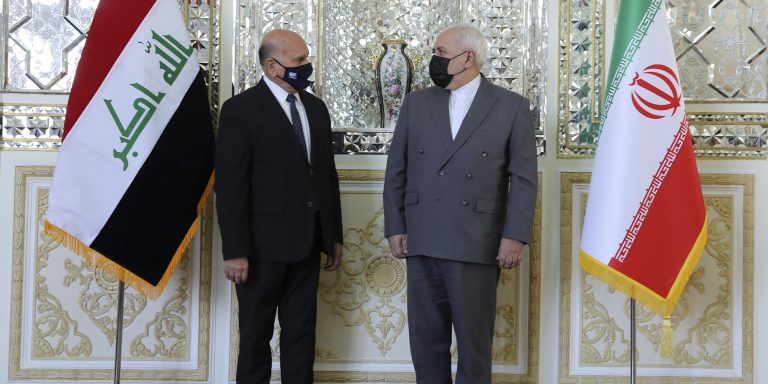INTELBRIEF
October 20, 2020
IntelBrief: Iran Gaining in Battle for Iraq

Bottom Line up Front
- Iran has made significant gains in its efforts to reduce U.S. influence in Iraq and drive out U.S. forces.
- Secretary of State Pompeo’s threats to close the U.S. Embassy in Baghdad will not prompt Prime Minister al-Kadhimi to rein in Iran-backed militias.
- The militias’ proposals for a ceasefire suggest confidence in their political and military strength.
- Iraq is helping Iran mitigate the effect of U.S. sanctions by allowing Tehran to use its Iraq-based assets to buy needed goods.
Since the United States and Iran tacitly cooperated to defeat the challenge to Iraq’s integrity posed by the so-called Islamic State, the two powers have conducted a bare-knuckled competition to align Iraq with their respective interests. The U.S.-Iran battle for Iraq escalated dramatically in January 2020 with the U.S. strike in Baghdad that killed Iran’s revered Islamic Revolutionary Guard Corps – Qods Force (IRGC-QF) commander, Qasem Soleimani, and Abu Mahdi al-Muhandis, the head of the Katai’b Hezbollah (KAH) militia – the IRGC-QF’s main proxy in Iraq. That strike motivated the Iranian leadership to try to drive U.S. forces and personnel out of Iraq. To try to do so, the IRGC-QF instigates and supports its Iraqi proxies to conduct constant attacks on the U.S. Embassy in Iraq, military bases that host U.S. troops, U.S. and U.S.-led coalition convoys, and facilities of U.S. companies working in Iraq. The Trump administration has responded through strikes on the militias when attacks have caused U.S. or coalition casualties, and by pressing the government of Prime Minister Mustafa al-Kadhimi to deploy Iraqi forces against them. Kadhimi’s failure to rein in the militias, despite several attempts, has rendered him hesitant to renew such efforts unless success is assured. The impotence of Iraqi forces was demonstrated again on October 17, when security forces failed to prevent Iran-backed militias from storming the Baghdad headquarters of the Kurdistan Democratic Party (KDP). The KDP supports Kadhimi and the U.S military presence in Iraq, and the assault was in response to a top KDP official’s call for stepped up security operations against the militias.
The continued attacks on U.S. forces, coupled with the approaching U.S. election, have caused apparent shifts in Trump administration policy that are furthering Tehran’s aims in Iraq. During September, U.S. force levels in Iraq were reduced from 5,200 to about 3,000, apparently in an effort to partially fulfill President Trump’s promise to extricate the United States from the region’s ‘endless wars.’ Yet, the drawdown signaled to Tehran that the U.S. commitment to Iraq is diminishing. Also in September, Secretary of State Michael Pompeo threatened to close the U.S. Embassy in Baghdad unless the Kadhimi government stops Iran-backed militia attacks. However, when coupled with the U.S. drawdown, the ultimatum essentially emboldened Iran-backed forces. In mid-October, KAH - acting on behalf of a broader coalition of Iran-backed militias calling itself the ‘Iraqi Resistance Coordination Commission’ - announced it would agree to a ‘conditional’ ceasefire if the United States outlined a timetable to withdraw all remaining U.S. forces from Iraq. The statement suggested that KAH and its allies are confident that they can force a full U.S. pullout, and in so doing deliver to Tehran both revenge for the killing of Soleimani as well as unchecked long-term influence in Iraq.
Iran also has apparently managed to thwart U.S. efforts to enlist Iraq in its ‘maximum pressure’ campaign of crippling economic sanctions. The United States has been providing Iraq with sanctions waivers permitting Iraq to import needed natural gas and electricity from Iran – on the condition that payments for the energy remain in an escrow account held by Iraq’s Trade Bank. The Trump administration has progressively limited the duration of each successive waiver in order to encourage Iraq to arrange alternative sources of energy. After months of negotiations, Iran announced in early October that Iraq will allow it to draw down the approximately $5 billion in Iranian funds to purchase food and medicine from Iraq. This agreement suggests that the Iraqi government, facing declining U.S. political influence, is not willing to cooperate with the U.S. maximum pressure policy against Iran.
Although Iran appears to be gaining in its battle with the United States to exert influence in Iraq, Iran too will no doubt face setbacks. As in Lebanon, pro-Iranian parties in Iraq have become part of a political and security structure that many Iraqis have protested against as corrupt and ineffective. As Iraq heads toward new national elections in mid-2021, nationalist sentiment, some of which is directed against Iranian influence, will almost certainly gather strength, particularly if the dampening influence of the COVID-19 pandemic on public protest wanes.